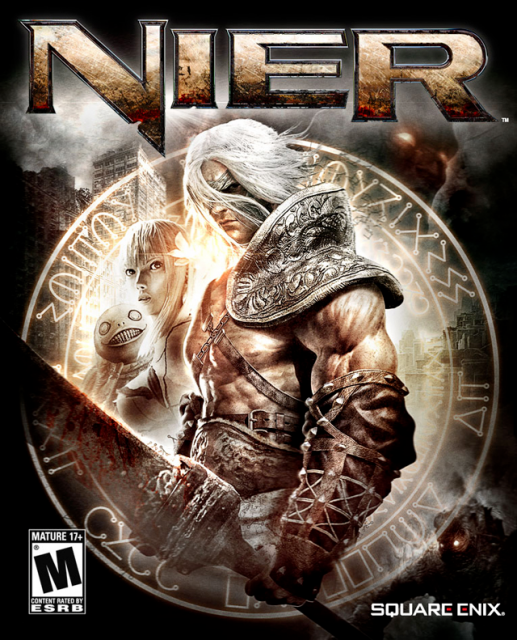Nier: The Most Mixed Bag There Ever Was
Nier is an oxymoronic miracle. Rarely does a game go so thoroughly out of its way to seemingly appear dismissive on virtually all accounts before attempting to reverse course at the very last second, but that's exactly what Nier does. As a game, the myriad problems that you're bound to experience for its entirety, often ones that are easily fixable, make it extremely tough to recommend and its few merits aren't nearly good enough to justify buying it. By no means is it the sort of game that one should want to play. Yet as an experience, Nier is something much more complicated. It is a terrible mess of a game both on the surface and on a fundamental level, but one that does have a surprising amount of impact if you give it more patience than it deserves. That realization doesn't come until well into the ending portions, though, making any remote payoff or redemption from it arrive far too little, far too late.
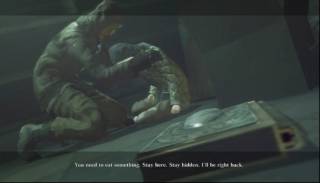
Nier has no one issue that completely breaks it as a game. In actuality, this is a game that, if nothing else, does manage to remain fully functional from the beginning to the end. Everything will by and large work as expected them without any real incident. If a compliment is to be paid to the gameplay portions, it's that at least nothing is outright broken trash. Nevertheless, Nier just has a lot of content that is half-baked in execution, with no one part ever being particularly satisfying. There is a lot to it, but at the same time, it somehow manages to do too little good with too much ill-developed, mediocre filling, which extends into nearly every aspect of the game, technical, mechanical, and artistic.
This path to nonfulfillment begins with Nier's storyline and is then continually accented by the actual gameplay. You take on the role of a single father who spends his days tending to his perpetually sick daughter. With no cure in sight and fed up with his inability to improve his daughter's prospects, he decides to venture out into the world to find a solution on his own. The friends he meets along the way and the fights he has with innumerable Shades, the game's yellow and black-clad antagonists, all have secrets about themselves and the nature of the world itself that prove to be pivotal in the father's attempts to return his daughter to good health. In practice, what this means is that Nier is an action-adventure game with very light RPG elements. When the game isn't developing its narrative, most of your time is therefore spent either doing exploration in dungeons and the overworld or in combat with the Shades, which consists predominantly of hack-and-slash elements mixed with the requisite magic. A basic leveling system is in place for character growth, as are sidequests that can largely be pursued at your leisure. These are essentially the basic systems that drive Nier and they are, if nothing else, completely functional and playable.
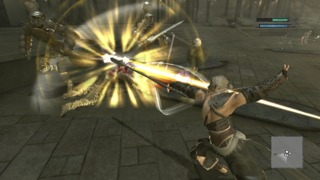
These premises seem to have some potential at first, even if a lot of its basic tropes in the plot and gameplay have been witnessed in numerous other works previously. However, this potential is mostly squandered from the get-go and is executed so haphazardly that it's hard to really care about anyone or anything going on in the game. There are a lot of tangential elements in the game that try to provide the illusion of depth or a greater purpose to everything, but those promises never come true. The combat, for example, can very quickly boil down to being entirely composed of button mashing, if that's your inclination. Sure, you have the option of different weapon types to try out and numerous individual weapons to wield, but they all operate mostly the same, even between contrasting types. Changing weapons is like switching from pair of shoes to another; they might feel different as you break them in, but you're certainly not forced to change how you fundamentally walk. Nier's attempts a diversifying the combat with switchable armaments is exactly the same way. A parry system is also in place if you want to get that hardcore with it, but no enemy ever makes it worthwhile. Even the presence of an augmentation system in the form of magical words that you can attach to your weapons does very little to change the look and feel of fighting.
You do also have access to the Sealed Verses, which are Nier's magic spells. The fact that each one actually has different mechanics in executing them does bring a little diversity, but since it's easy to run out of magic points and can take quite a while to recharge them, physical combat is, unfortunately, your main meat and potatoes when skirmishing in Nier. That's not to say that the magic is significantly more fleshed out or enjoyable. They only change the pace of what's still a very unengaging part of an even more unengaging game.
Likewise, the Shades that you fight are uninspired and become unoriginal even just a few minutes after being introduced to them. They come in a few different varieties, but like the protagonist, they tend to enjoy nothing but hitting things a lot, so that's all they ever elect to do. Whether they're slamming you, hitting you, or slashing you, their attacks are telegraphed incredibly blatantly and can be countered with the same combos you input day in and day out, regardless of the situation. That's, of course, when their AI remembers that they're actually supposed to fight, which it tends to forget regularly, something that also afflicts your party members. The Shades can also block, but you can always just brute force your way through those, too, despite there being a dedicated guard breaking mechanic, too. Some Shades are also capable of shooting out magic projectiles, often in great numbers that emulate bullet hell shooters. Like regular hand-to-hand combatants, though, these enemies and their bullets, too, are usually easy to counter no matter how much the patterns might change. This thusly makes them feel less like an exotic addition on top of the action-adventure core so much as as a strange afterthought.
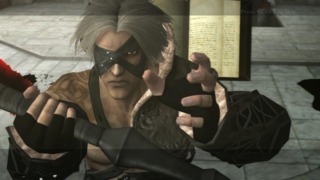
Much of the fighting in Nier takes place in dungeons, which are laughably basic and serve mostly as a means of providing enemy encounters in increased doses. There are occasional puzzles, but they're rudimentary in nature, often consisting of nothing more than finding a single key or doing extremely easy block moving. These puzzles are so disposable that they feel like rejected versions of ones you would find in something like the original Legend of Zelda. Bosses, naturally, are at the end of every dungeon, although the actual process of fighting them consists little more of hitting their weak points and avoiding their patterns, things which aren't even always included in those encounters. Beating them does result in unlocking new Sealed Verses, which is one of the few rare instances of gratification that Nier provides. They otherwise continue the same cycle to be experienced day in and day out while fighting in Nier, never to force any noticeable deviation whatsoever. It should also be noted that despite being relatively few in number, the game's plot forces you to repeatedly revisit the dungeons and even more so for side quests. Little, however, is done to make them interesting for your return trips, save for equally mindless alterations of the existing condescending puzzles.
The gameplay is consistently unengaging elsewhere, too. Nier's overworld, as it turns out, doesn't exist for much of a purpose other than providing the roadwork to connect you to the actual destinations in the game. Aside from fighting any Shades you may encounter in your travels, there isn't much to see or do outside of the major hubs and the world is otherwise a pretty barren place. Likewise, the RPG elements, which manifest solely in the form of a typical level and experience point system based on felled enemies, exist only as a means to buff up your character's health, magic, and attack capabilities. They serve no deeper purpose for character development and the level-up process is so transparent and automatic that it's quite easy to forget that the game even has it at all.
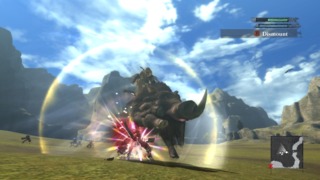
Side quests in Nier are furthermore so malnourished in the creativity department that they almost always feel entirely lifeless. Save for a few that directly connect to the main storyline, the side quests are entirely inconsequential and hold no significant bearing when it comes to fleshing out the world. Worse still is how many of them consist solely of just MMO-style fetch quests in which a townsperson will demand that you get some arbitrary amount of an item dropped by an enemy or creature in the world. That sort of design is already tedious on its own, but when some of the items involved also happen to be rare drops from otherwise common enemies, the experience of completing those side quests just becomes all the more aggravating. In one quest, for instance, you may very well be forced into killing dozens of sheep just to acquire three hides. Despite the fact that you can clearly see the wool just sitting on top of the ones you kill, more often than not, you'll receive sheep meat and only sheep meat. Such are the sorts of fallacies that afflict Nier's alternative pursuits. No reward aside from cash is usually given for completing them, either, which is not that necessary for completing the main storyline anyway. The only legitimate reason for completing them is to gain access to two of the game's four endings, the reasoning for which is non-existent, other than to artificially lengthen the playing time.
Most unfortunate of all when it comes to Nier's abundantly blasé, uninspired content is its story. Despite its heavy, constant developments in both cutscenes and actual gameplay, character motivations and explanations for many plot points are really underdeveloped and executed so haphazardly that it's hard to really care about anyone or any of the events in the game. That's assuming you even understand them at times. At its worst, parts of Nier's story are executed badly enough to make you wonder why they even matter. These sorts of problems are most apparent in the relationship between the main character as a father and his daughter, the most fundamental relationship that's meant to drive the entire game. Why anyone should care about this particular family and its trials is something that is never fully justified. The daughter is sick and the father is deeply bothered about that, yes, but the game doesn't care to substantially explain why they and their troubles should empathetically matter to outsiders, as if to say the only reason we should need is that they have problems. A few cliché bonding moments are displayed periodically, but they aren't nearly enough to elicit any substantial emotions, let alone drive the thirty-plus hours of gameplay Nier expects you to endure.
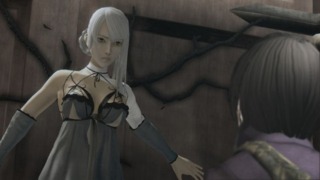
The same is true for Nier's supporting cast members. While they have some interesting twists, they aren't otherwise sufficiently explored and, for much of the game, they fit specific archetypes all too well. You will come to know Kanie, your very buxom and oddly-clothed lady friend, for example, mostly for her profoundly foul speech patterns and Emil, a boy not much older than your own daughter, as one of those tragic kids whose life is both a blessing and a curse. They both undergo critical changes and transformations as characters, but never completely overcome the initial first impressions that the game provides. The details merely garnish their otherwise often stereotypical personalities and histories. They also don't necessarily compliment each other and the main character well as a cast, either, which makes it that much more difficult for them to really matter as you play the game.
Intriguingly enough, though, Nier tries to turn all of that around at the very last moment in its ending sequences. Only then does the game actually give you a glimpse of the greater forces at work in Nier's world and its characters, something which it entices you to explore further by starting subsequent runs. Replaying the game again unlocks a host of new narrative content that give Nier the substance and emotional depth it so desperately needs, especially with regards to characterizations. Although the main events themselves always pan out the same, the added narrative elements go far in recontextualizing your efforts and character motivations to the point where the game undergoes a radical shift in tone. There are also a total of four endings to access, one of which actually plays on the fact that Nier is a game to a great effect. Adding new events and dialog to new game-plus runs is hardly a new idea, but Nier does it so comprehensively in certain spots that it makes your very first run feel like a retroactive exercise in ignorance.
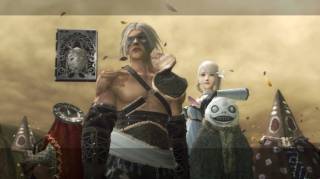
While the effects of this effort are to perhaps be applauded for at least existing somewhere in Nier, they still come far, far too late to rectify the rest of its problems. No matter how much depth the additions give to the characters, how much emotion is reinserted into key plot points, they still don't get rid of what's a very rough, ugly interior that drives the game to that point and continues to drive it while you're experiencing the story again. You still have to plow your way through repetitive content, lackluster exploration, brain-dead puzzles, and inconsequential side quests while seeing the story unfold anew. Only the context of what the protagonist is doing in Nier changes, not the actual mechanics behind it. That's probably to be expected, but it's still unfortunate that the game is saddled with that reality. What's more, considering how many of the crucial character developments are reserved for second, third, and potentially even fourth runs, it feels as though the game is deliberately holding the good parts of the story hostage during that first time through the game. Nier's plot would have benefited a lot from just being upfront with those developments and including them in the first run. Otherwise, without forcing yourself to play through the game repeatedly, the game feels that much more lacking.
But even a technical level, Nier still can't help being thoroughly subpar. The visuals outside of major in-engine and CG cutscenes are rarely better than okay. On top of sporting an aesthetic style that's bland to see, the texture and model quality during gameplay tends to be fairly poor. The technology behind it all, too, has a knack for seemingly making the visuals spontaneously worse on a whim. Character models when the camera is close on them during gameplay will make them sport blurry, out of focus textures on the spot that can only be cured by moving the camera again. Heavy anti-aliasing is also usually present and can deteriorate even further when numerous models are on the screen simultaneously. The frame rate, thankfully, is the one thing that usually stays relatively stable, although it, too, can falter when there's too much chaos on the screen.
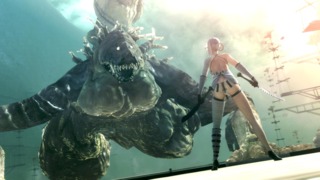
The sound design also suffers from a similar lack of inspiration, but it at least is more consistently functional. Nevertheless, nothing in particular sounds all that impactful, especially during combat. Meanwhile, the voice acting is of a decent quality, neutered only because of the material that the actors have to work with. Laura Bailey as Kaine is the one standout, though; she does an amusingly good job of bringing the character's angry, expletive-laden personality to life, which is made all the more impressive when considering that she tends to be known for her more subdued roles. Her voice doesn't substantially develop the character much beyond the game's limited scope intended for her, but her vitriolic speech does a lot in making her begrudgingly memorable.
However, in directly ironic contrast to the rest of the game, the one consistently great thing Nier actually has going for it is its music. This is not a relative statement made in comparison to the rest of the game's components, either. On its own, Nier's soundtrack is one of the best produced in this past console generation. Predominantly classical in nature, it has more raw emotional power than anything else the game provides, particularly because of its use of softly haunting, omnipresent vocals. While the musical selection has its share of major stand-outs, such as the credits music, every piece in the game is very well-crafted and as such is a great joy to hear. There's also a great variety of it, too, which means you'll usually get treated to something wonderfully new for critical story moments and important fights. It's all so good, even in isolation from the game, that I honestly wonder why it wasn't put to use in a better game that actually deserves it. But much like the late narrative revelations, the soundtrack's impact on Nier's quality as a whole is still greatly limited because of everything else that holds it back, which is an enormous shame.
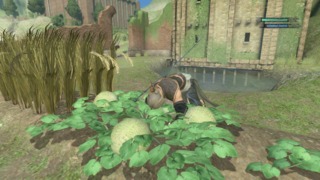
Don't be mistaken. Nier is a horrendous mess of a game not worth playing in good conscience. Its broad, but highly shallow gameplay never amounts to any higher standard than feeling tedious and ill-conceived and the narrative has very, very little impact or emotional significance for most of its duration. The technical and artistic aspects, too, save for the music, are exactly of that same quality. No matter how much it tries to reform itself into something better during its conclusion and additional runs, there's simply nothing it can do to make up for all the problems it has short of being remade from scratch. It is admirable that it actually attempts to be redemptive at the least likely moment, but the fact that it happens right at that point is precisely indicative of the deeply flawed nature of Nier's narrative and overall structure. So much goes wrong enough in Nier that you will probably never get a good return on investment, should you make the regrettable decision to do so at all.
